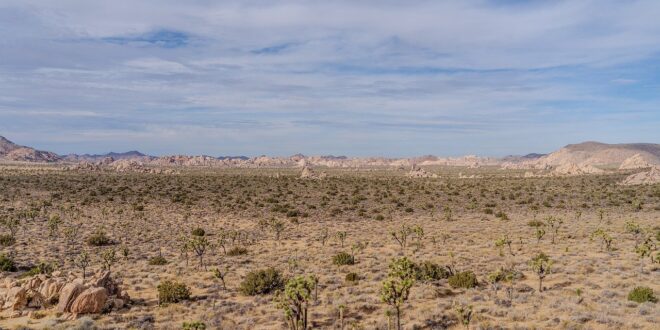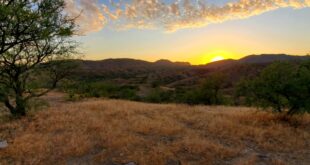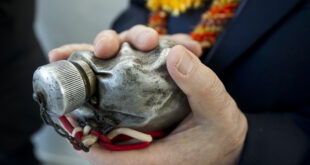by Susan Katz Keating
The cowboys were out on the range on a Texas morning, fixing fences that were cut down the previous night by intruders. Bobby, a “lifelong ranch hand” at age 28, was alone on his horse in a remote pasture. He heard a scream; a weird, piercing shriek that made his neck twitch. Thinking it might be a person in distress – a frequent occurrence out here in the wilderness – Bobby rode toward the shrieks. What he found made even the horse shudder.
There on the ground sat a man, filthy and parched, holding a screaming, bucking rabbit by the hind legs – while gnawing on the creature’s haunches.
“He was eating the live rabbit,” Bobby said. “Trying to, anyway. Just like a coyote. He was ripping right in with his teeth.” The young man shook his head. “That was a bad scene.”
READ MORE about smugglers and gunfire on the southwest border
Out in the remote backcountry, where smugglers and migrants and lost souls increasingly are part of the landscape, bad scenes have become as common as stray clouds.
One such happening came to a head in April, when Arizona prosecutors said they would not go for another round in the shooting of a Mexican national, after the case resulted in a locked jury.
In that incident, a judge declared a mistrial against George Alan Kelly after the jury failed to reach a verdict over whether Kelly was responsible for the death of Gabriel Cuen-Baltimea, who was found shot to death on Kelly’s ranch near the southern border on Jan. 30, 2023.
But there are many other scenarios, demonstrating the dangers of life in the region.
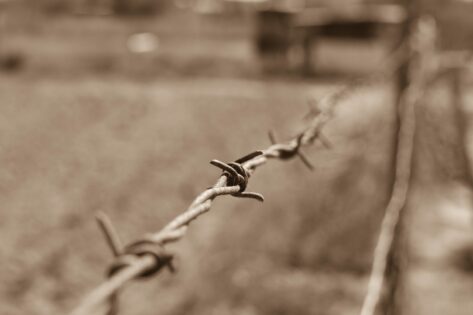
Cowboys and ranchers say that in recent years, they have found dead bodies, rape victims, hungry children, blood-soaked rags alongside shell casings, and more.
“It wasn’t always like this,” Bobby said. “Now, you have to expect it.”
The frustrated cowboy spoke to Soldier of Fortune earlier this year, when national attention was focused on the standoff between federal and state authorities in Eagle Pass, Texas. The confrontation centers on addressing the daily influx of people who try to cross illegally from Mexico into the United States.
Nationwide, the number is staggering. Officials documented 2.4 million encounters overall in fiscal year 2023. In December alone, officials noted a record 302,000 migrant encounters at the border.
Efforts to secure the line remain high in Eagle Pass, where soldiers from a number of state National Guard units are stationed.
“They’re out there putting up wire, and we have all the reporters and politicians coming in,” said resident Erica Silva. Amid the influx, she canceled her annual family reunion. “You can’t get a room anywhere at a normal price.”
Beyond Eagle Pass, in the southwest wilderness, you can’t get a room at any price. You can’t even find a hotel. None exist. And the land is far from hospitable.
Ranchers describe desperate scenarios, where they have inadvertently ridden into crossfire between rival smugglers, or have been held up at gunpoint.
“We’ve had our trucks stolen, our food ransacked, even our boots taken,” one rancher said.
“No one is safe,” Bobby added. Not the cowboys, the ranchers, their livestock, and especially not anyone who traipses on foot through the unforgiving scrub.
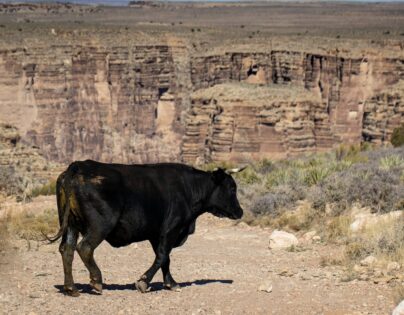
The Southwest scrub is unforgiving
“We’ve had people that have walked into our house,” said Russell Johnson, a fourth generation cattle rancher who lives and works along eight miles of the southernmost edge of New Mexico. “They were lost, and been out of food and water for days and wanted to use the phone to call their smuggler.”
If people are at that point, they’re usually pretty desperate, Johnson said. “And if they’re at that point of desperation, they’re going to do whatever they need to do to get that stuff.”
They get that way by traveling the land, he and other landowners said.
“Passing through a remote ranch like ours in the Southwest is dangerous,” according to JR Ramirez, whose family runs two commercial cow-calf operations. “South Texas is known for its extreme temperatures,” which in years past have reached the triple digits in March through October. The heat and humidity create life threatening situations with no way to ease the effects.
People who are lost or left behind in desolate areas are at risk of dehydration, heat stroke, injuries, or death, according to Benjamine “Carry” Huffman, a high ranking official with the U.S. Customs and Border Protection agency (CBP).
People who wander alone in the wilderness often are hurt, Johnson said. “If they get injured, their smugglers just leave them,” he told an interviewer.
In Texas, Ramirez has found people when it’s too late to save them.
“We have found ten deceased migrants in the last two years on our ranch,” Ramirez said.
Ranchers in New Mexico also have found corpses.
“There have been a handful of bodies found out here,” Johnson said. “There’s been one found on our ranch and several found on the neighboring ranch.”
The cattlemen frequently don’t know why the people died.
“Are they dying purely of exposure to the elements, or do they have some kind of illness that progressively gets worse as they come over here,” Johnson said.
Often, the crises occur near a watering trough. Migrants drink from the slimy troughs and get sick, or they station themselves there deliberately.
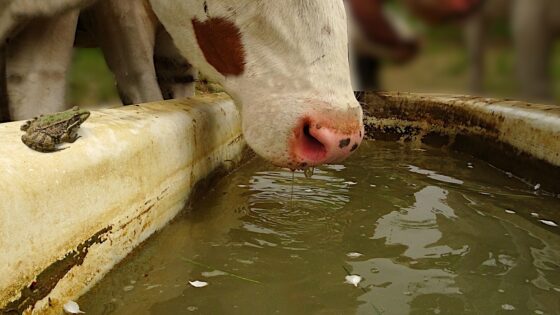
Humans can get sick if they drink water from a trough used by animals.
“They make their way to livestock water in hopes of being found, and then succumb to whatever’s got to them,” Johnson said.
Which is how the “lifelong ranch hand,” Bobby, encountered the man with the rabbit.
“He was maybe 30 feet from a water trough,” Bobby said. “I don’t know if he drank from it. He was so dry. The dirt was ground into him.”
The rabbit was a lucky find, Bobby guessed. The little creature was bleeding from one foot, possibly after getting caught in the same barbed wire the intruders had cut down the night before.
The rabbit, too, was lucky. The man was so weak and the animal so determined to escape that the little creature wrested free, leaving its captor scratched and bleeding.
Bobby kept his distance, but signaled to the man to stay put.
“I called out to him, in Spanish. I told him I was gonna get help.”
Bobby tossed the man a water bottle, and headed off to find a buddy cowboy. Together they would follow ranch protocol: call a rescue squad.
“We only get involved as citizens reporting an emergency,” Bobby said. “We’ll wait for a first responder to arrive, and that’s it. We go back to work. Someone else picks it up from there.”
When Bobby and his buddy rode back towards the trough to say that help was on the way, the man was dead. First responders later arrived on scene.
“He didn’t make it,” Bobby said. “But at least they found him.”
It doesn’t always turn out that way.
In his 2023 testimony before the House Committee on Homeland Security, Ramirez told lawmakers that untold numbers of people may have succumbed in the wilderness, where they will remain undiscovered.
“It is painful to think of the bodies across these remote landscapes that will never be found, or of the individuals that are, at this very moment, struggling to find clean water or shelter who only have days, if not hours, to live,” Ramirez said.
Bobby knows the process well.
“It’s a far cry from Eagle Pass,” Bobby said. “We don’t get the attention they get. But here on the ranch, it’s a dangerous world.”
With reporting by Jose Campos.
Susan Katz Keating is the publisher and editor in chief at Soldier of Fortune.
 Soldier of Fortune Magazine The Journal of Professional Adventurers
Soldier of Fortune Magazine The Journal of Professional Adventurers


